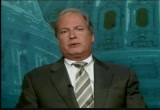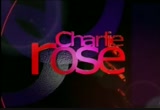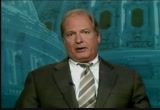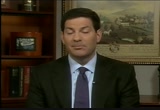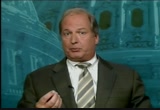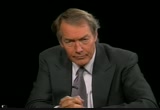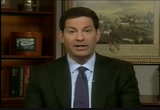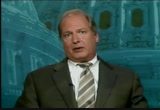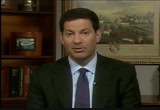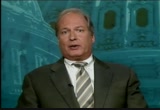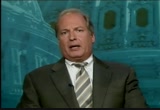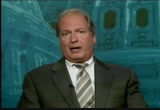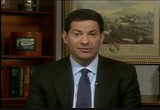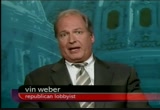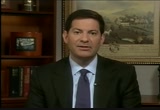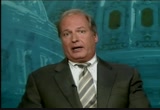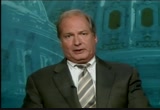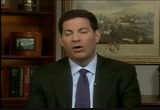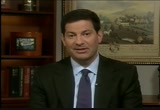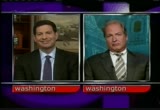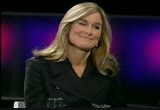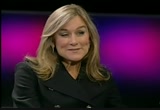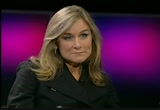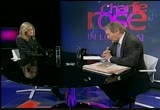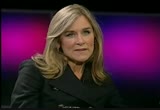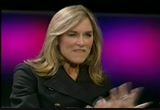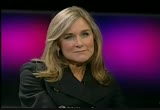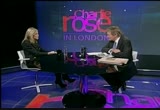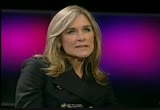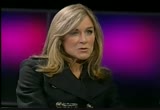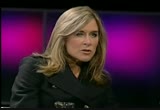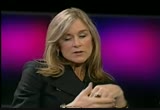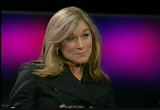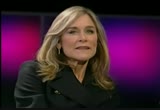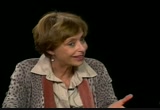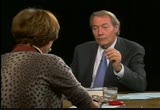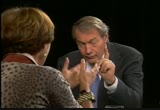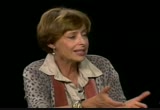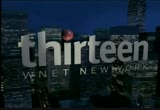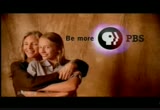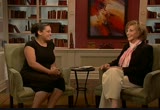tv Charlie Rose PBS September 16, 2010 12:00pm-1:00pm EDT
12:00 pm
>> couric: welcome to our program, tonight, politics and the tea party in the republican party with mark halperin and vin weber. >> almost every challenge we face now is going to require cooperation between a democratic president and a republican-controlled congress in full or in part and i i think the tea party and the animation it's bringing now to bring specific people in and to put the fear of god into a lot of non-tea party establishment republicans is going to make it very difficult to solve our problems. >> i think there's a lot of vilification of them, particularly from folks who like to imply or some cases just state flat out that a lot of this is motivated by race. i really don't believe that. we certainly have racism in this country and we're not going to
12:01 pm
be rid of that probably in our lifetime. but these people are motivate bid a sincere concern about the country. >> couric: and we continue with a secretary generalment from our london visit with the american-born c.e.o. of burberry, angel la ahrendts. >> we happen to be in the business of fashion but we employ nearly 7,000 people around the world and we have a company in china now that employs mostly young women. so if i can help all of them dream bigger and they can feel me and aren't i better? isn't that my job? >> rose: we conclude this evening with annie cohen-solal, a writer whose latest book is about the gallery owner leo castelli. >> i think leo castelly is a bridger. leo castelli is somebody who wrote this this country, to this wonderful continent, to the art world which is so complex here.
12:02 pm
he brought a lot of elements from his own culture which is europe. first of all. he considered that artists are e seine tomorrow a culture. then he made the link between the market and the museum. he organized himself a network of galleries, of critics and his gallery became as important as a museum. >> rose: a program note. we promoted this evening a one-hour conversation with associate justice of the supreme court steven breyer. that conversation will be seen in full on friday night. tonight, politics, fashion, and a biography. next.
12:03 pm
12:04 pm
. >> rose: we begin this evening with the dramatic political news that happened in selective primaries across the country. overall, the results underscored the strength of the tea party movement and the divisions in the republican party. all eyes were on the republican primary for the senate seat in delaware. long shot candidate christine o'donnell backed by the tea party and sarah palin beat popular moderate republican and nine-term congressman michael castle. in the new york governor's race, political newcomer carl paladino, also supported by the tea party, defeated former congress and early favorite rick lazio. it was another surprise win. the question is, what do these results say about the midterm elections and the political outlook for the next two years. joining me now from washington, vin weber and mark halperin. let me go to vin first. tell me what this means for the republican party. >> well, i'm of the opinion that the tea party movement-- broadly defined-- is overwhelmingly an asset for the republican party. now, the victory in delaware
12:05 pm
last night was not a good thing for the delaware senate seat. mark may have a different opinion about that, but i think that that's probably a bad sign for us. but the other part of that sign, charlie, if i were a democrat, for instance, running for the house or for the senate somewhere else in the country, i'd look at that delaware outcome and i'd say we have one more piece of evidence that the right in this country, the conservative base of voters, is enormously energized. they're going to turn out if large numbers. they turned out last night to defeat a moderate republican. but they're all going to vote in november and they're all going to vote against the democrats. >> rose: mark? >> i agree with that. in the short term the republicans suffer because they've take an sure win and made it a very likely loss and that what's likely necessary to get the ten seats they need to take back the majority. i agree between now and november this is an unaloyed good for the republicans except to the exsent that the democrats suck sneed what they're trying to do which is to define the entire
12:06 pm
republican party as captive to the tea party. i don't think it's going to work with independents or republicans. i think what democrats are trying to do now and david plouffe, president obama's top campaign strategist during the campaign and helping now said in iowa... all but said this. what they're basically trying to do is energize their own base which is incredibly dispirited. after the election as we go to governing and then the presidential, i think the tea party is a very dangerous dynamic for the republican party. but in the short term, very positive. >> the people that are getting elected, particularly on the republican side this time, are going to be aware of the tea party phenomenon. they're going to be aware of primaries that were run against establishment and in many cases incumbent republicans largely on the issues of spending. and there's going to be a lot of votes if the republicans take the majority particularly in the house which i think that they will that are going to be heart for them to cast that a governing party must cast at some point a governing party must fund the government. and the spending has become so taboo in the course of these campaigns that it's going to be very difficult for the new
12:07 pm
congress, for congressional republicans particularly, to ever cast a vote to fund the government. >> rose: is that what you mean, mark? >> that is a very big part of what i mean. a lot of people in our business, all of us love politics, it's a great american mast time and spectator sport. but governing is what matters. that why we have the elections. a lot of people say what does this mean for president obama? there are implication there is. but there are basic governing things that have to be done not just for the political health of the republican party-- although the congressman spoke to that, i think, quite on point. it's also for the health of the country. almost every challenge we face now is going to require cooperation between a democratic president and a republican-controlled congress in whole or in part and i think the tea party and the animation that it's bringing now to bring specific people in and to put the fear of god into a lot of non-tea party establishment republicans is going to make it very difficult to solve our problems. >> rose: is the essence of it... is the essence of it against spending? is that what the tea party is for the most part?
12:08 pm
>> i think that that's really the core of it. if you talk to candidates out on the road that have had trouble with tea party opponents, it's almost always over a vote that they've cast on a spending bill. that's what motivated the tea party more broadly than that. there's, of course, a fringe-- as there is on any grass-roots movement-- that gets into peripheral issues and weird issues. but most of it is just focused on spending, borrowing to an extent on taxes and that's going to be very difficult. spending>> spending is at the cf it. if you look at the rhetoric not just of the candidates but the party and people on cable t.v. and talk radio, the health care law is a big part of it. now, that relates to spending but that's a big animating force. as well as an anti-washington sentiment. and then a personal anti-obama sentiment. there's no doubt about that some of that goes to the fringe but some of it is something we've seen with a lot of our recent presidents. liberals who hated ronald reagan. conservatives who hated bill clinton. liberals who hated george walker bush. a lot of it is animated by simply wanting to not just send
12:09 pm
a message to barack obama but stop him from doing things they don't like. most of which fall under that umbrella of spending. >> rose: because they think what about obama, vin? >> a lot of republicans, a lot of conservatives-- both in government and down at the grass-roots level-- genuinely think that the president when he uses the word "transform" or "transformation" which he does often is trying to turn the country into something very fundamentally different than they want to see it. i guess the short hand phrase, charlie, people often use is a european socialist state. i don't like that phrase. it implies other things. but something very different than most conservatives and republicans view as their vision of america. and the health care bill is sort of the epitome of that and there's a widespread feeling among republicans and conservatives that if that is fully implemented we will be too far down the road towards this transformation that they don't want to see to ever come back. and so a republican majority is going to be ready to fight with
12:10 pm
the president because they really believe the stakes are very, very high. and you can't at the end of the day simply say this is anti-obama because it's not anti-obama personally. it is a deep felt philosophical belief just as deeply felt as the president has about his progressive vision of the country. >> well, i want to say they're talking about two groups that are part of this anti-obama agenda and i think some of it is personal anti-obama the person agenda. one is the tea party itself. i think too much of the east coast press is dismissive of them as know-nothings or in some cases impugning their motives. these citizens who are really energized and as we saw in delaware on tuesday night are able to vote in big enough numbers to shake up the republican establishment. the other group that is a big part of the feelings about the president and his agenda, not tea party members by any means, are business people throughout this country. from fortune 500 c.e.o.s to real estate agents to small business people.
12:11 pm
one of the groups that the president has really alienated is people who believe that he doesn't understand the market in a fundamental way. no appreciation for markets, no desire to shape government policies to take advantage of the market. the president would disagree with that analysis of his policies but that in coalition with the tea party, with shared agenda of washington is spending too much money, the policies are not good for business, that is a powerful coalition in terms of energy and it's big and wide despite the result in delaware where republicans have probably lost one they would have won. this is likely to be a very, very big republican year and as congressman weber and aagree, most of the tea party candidates who have gotten attention in places like kentucky and colorado, most of them are going to win. >> rose: is it mainly against something rather than for something, then? >> at this point, very definitely, charlie. it's against what they see as an unprecedented expansion of the
12:12 pm
federal government. debt, spending, regulation, government intrusion into the economic affairs of the country. and that's what they're trying to stop. and it's why the democrats' argument throughout the last year and a half that the republicans are the party of no has not resonated at all with the voters and in my judgment won't resonate. at this point the voters, the majority, seem to want to just say now. now, at that... some point that isn't going to be enough. certainly their presidential candidate in 2012 will have to have an agenda. but right now the tea party movement-- and i believe they stand for a large swath of america-- have been scared by the runup of debt, spending and the expansion of government and their main motivation is to slow it down or stop it. >> rose: does vin weber feel comfortable in the republican party that the tea party plays such a significant role? >> i'm confident that i'll find my place in the republican party. you know, these people are good
12:13 pm
people. and they are reacting maybe in some cases overreacting but we did see a radical expansion of government, some of it was in response to the economic crisis, i understand that. but the people that i've met in the pea party movement are by and large good folks. when they start worrying me a little bit is when we get into issues like immigration. one of the candidates made a misstatement, many n my view, on the 1964 civil rights act. some of these issues where i don't feel comfortable with what they're saying. but the bulk of the members of the tea party simply want to restrict the expansion of government. that's what republicans believe in-- limited government. >> rose: i don't think anybody... i mean, do you think people are saying they're not good people? it's more of a political difference in terms of how they view where the country is and where it ought to go than some sense of anybody saying they're not good people. >> i think there's a lot of vilification of them, particularly from folks who like to imply or in some cases just state flat out that a lot of this is motivated by race.
12:14 pm
and i really don't believe that. i mean, i... we certainly have racism in this country and we're not going to be rid of that, probably, in our lifetimes. but these people are motivated by a sincere concern about the country. >> rose: mark? >> well, i think that... >> rose: motivation. >> yeah. i mean, they are... other people have made this point so i don't want to pass it off as original. they're as scared as they are angry about their future, about their children's future, and about the loss of jobs in this country. i mean, the unemployment rate is so high that it touches almost every american outside of elite circles. and i think that's a fear animating a lot of this. there's no question in my mind that the leadership of the republican party is not just troubled by probably losing the seat in delaware but there's a sense... you talk to a republican strategist that they now have an unpredictable force on their hands. they think it's enough to drive
12:15 pm
them to victory in november and i think at this point they're right. but beyond that, in governing and in the next election it is an unpredictable force. you look at everything they tried to do to save mike castle, the establishment candidate in delaware. the state party, the national party, various endorsers, the governor of new jersey, all coming in to try to stop o'donnell from winning and they couldn't. and i think just from a cultural point of view, there are elite republicans who are just as der ric sieve in their characterization of the tea party and some of the candidates and so their motivations as a blogger on the huffington post would be. >> rose: what is it that scares people, republicans, about o'donnell, the winning nominee. >> delaware's a pretty blue state. mike castle was thought at the beginning of this campaign to be the only republican in all likelihood that could win the state. the state wasn't all this democratic. we elected people like pete dupont and bill roth. but that's 20, 30 or more years
12:16 pm
ago. and now we've got a very conservative candidate and a candidate who has been vilified by her own party in the course of this campaign. i don't know if she could have won in any event, charlie. but certainly she's been harmed by the way that the republicans in delaware campaigned against her at the end. they created every 30-second spot that the democrats will need to run against her in the course of this campaign. >> rose: what does this say, mark, about sarah palin? >> well, i've said for a while i thought she was the most powerful person in the republican party. she's not picked winners in every race by every means. but she did pick a winning candidate, the more moderate candidate in new hampshire, the former attorney general there who won her primary yesterday. and she did along with senator demint from south carolina come in to delaware as the only prominent national figure to endorse. she's got really good instincts and not just for who to pick-- although not in every case-- but
12:17 pm
also about how to describe what's going on. and the thing that i can't to be waiting for is to see... and it will happen as she runs for president. does anyone in the republican party ever stand up to her? you've heard grumbling about senator demint and his endorsement in this case to help o'donnell win. i've not heard anybody criticize sarah palin for her endorsement. and, again, i'm wait nicaragua day as a spectator sport and to see how sarah palin reacts. because her power has continued to grow. she's not diminished in any way. and usually in politics if nobody reaches out to stop you from growing you keep growing. >> rose: is she the most powerful person in the republican party, vin? >> i don't know about that. there may be a sense here on sarah palin's part of the old phrase i think attribute to believe gandhi that "my people are marching and i'm their leader, i must get in front of them." >> rose: (laughs) . >> but there's certainly no question that at the grass-roots level she has an intense following unequaled by any other republican at this point. and i agree with mark, one of
12:18 pm
the interesting questions will be to see if she gets into the presidential race. f anybody ever criticize her. because her following is tremendously devoted to her. whether or not she's the most powerful i guess i'll stop short of that. >> rose: do both of you believe that the president and the administration from the get-go didn't understand the sort of where america was in a sense and that they wanted to do too much without understanding the implications of how that would be perceived fitting into the argument vin talked about of wanting to transform the country >> well, i think that they understand where america was, they just didn't understand how quickly they would revert. i mean, america was in a different place in the wake of the financial crash of september, 2008. they were ready to accept a much bigger role for government. but i think that the obama administration thought that this was a permanent turning of the page to a new progressive era and that wasn't.
12:19 pm
>> and i think that when they started with the assumption that congressman weber said they started with, they assumed that if republicans opposed them on the stimulus bill and other early actions by the administration that the voters would punish those republicans for voting against a popular president trying to fix the economy. instead, republicans went with the remaining core supporters that they had and that group has grown as there has been a negative reaction. i think two other miscalculation it is administration made besides the one i just mentioned, one is something i said before. i think they underestimated the extonight which they couldn't just assume that business would stay with them, big business, small business, etc., and they've lost that and i don't think all of the people in the white house appreciate the implications of that. and then finally they thought they would get a lot more credit for the things they've gotten done-- the stimulus bill, the health care law, dealing with the auto industry. they thought that those things would be popular and they could go out and run on a record of accomplishment and as other people have widely discussed,
12:20 pm
almost no democrat-- including the president-- is out there running on accomplishments so much as trying to demonize republicans for things like saying they want to eliminate departments or cut social security. >> rose: mark, you have said before that you think republicans could win as much as 65 person gain. do you still adhere to that? and do these results make it larger or lesser? >> well, you pushed me up. i've only said 60. you characterized it as a possibility. i think it could go a little bit higher at this point. on the senate side i thought they could get to the ten, i don't think they can now. they'd have to run the table on everything else or almost everything else. so i think it's as many as 60, as many as nine senate seats right now. and i don't see a lot of possibilities. i always say if the president is successfully repelled the martian invasion i think that could shake things up. but short of that, i don't see a lot out there that will change the dynamics. i think the democrats' best slope to grind out race by race, demonize republican candidates
12:21 pm
as best they can to try to save some of their incumbents. >> i'd love to be as optimistic as mark. is i think the republicans are going to take control of the house. i can't quite get myself to believe it's going to be 60-plus seats yet. but i think they're going to take control of the house. i agree that the senate is difficult but it's still possible. there are still ten democratic held seats that are competitive today. if you look at the polling within the margin of error that conceivably robes could win. and as mark pointed out, yeah, they'd have to run the table and take them all. that's not very likely. there's a couple more seats, though, that could become competitive, connecticut and west virginia. they might not be considered so today but they could... if those seats become competitive as we get closer to the election then we know the tidal wave that people have talked about is really emerging and the republicans could take both houses. >> rose: vin weber former congressman now washington power figure. mark halperin, a national
12:22 pm
political power figure, senior political analyst for "time" magazine, coauthor of "game change" which at some point in our lives will be in paper back if not already. is it already, mark, or not? >> no, sir. late october i'll come visit you. >> rose: late october. we'll see you then. >> rose: we're in london with angela ahrendts. she's the c.e.o. of burberry. she's seen the transformation of the 154-year-old company into an international fashion powerhouse. she grew up in a small town in indiana. she sewed her own clothes and dreamed about a life in fashion. she has fulfilled that dream once associated with the classic trench coat burberry now sells everything from accessories to cosmetics. the luxury brand made $2.2 billion in sales this year. i am very pleased to have heifer here on this program in london for the first time. welcome.
12:23 pm
>> thank you. >> rose: indiana to london. did you really, growing up in indiana, think, you know, what i want to do is be in fashion and what i want to do is run a great company? >> yeah. (laughs) yeah. i... i'm from... i'm one of six kids and i am right in the mid-sol i grew up in a competitive household and just loved fashion my whole life. grew up living in vogue magazine and hanging out at the mall and i actually didn't dream of london but new york, absolutely. i mean, new york, i would make it if i made it to new york and i got any job in the fashion industry. so i don't think... i don't think at that age i was looking ahead as c.e.o. and probably wasn't looking at c.e.o. even five years ago. >> rose: what did you learn along the way that has served you well today?
12:24 pm
>> it's a great question and i was fortunate to learn it my first year at university when i signed up for all of these design classes and i got in there and very quickly realized that i absolutely was not a designer. i had a really strong opinion on what they were all designing-- what was good, what was bad. but i wasn't that creative myself and i think that's really when my lightbulb went off and it was a self-discovery moment, who am i? if i'm not this, am i at. and i tell teams today what do you feel? and i feel it first and then tell them to bring me the facts. but don't bring me the facts first. and chris and i are both that way and it's scary because if we both feel it then there's no stopping us. >> rose: you mentioned christopher. i should point him. there's a photograph in a magazine i'm going to talk more about later. who who is he? >> he is the greatest creative... chief creative officer in the world today.
12:25 pm
he's young, 39-year-old british visionary and just the most honorable, trusted partner that... but such a visionary and we laugh because we always say he's the art and i'm the commerce. >> rose: right. >> and then we've got a great c.f.o. on my left and she's... so it's this team of people that divide and conquer and trust each other. but i introduced him to the team as the brand czar. >> rose: 40 so how do you define his skills? what makes up a great designer? >> in the case of burberry, he... because he's british and he's grown up with the brand owl of the years and didn't spend all of his time in england. we met at donna karan, he gets the brand. and so britishness is probably the biggest differentiator that we have. i mean, you know... >> rose: if you think
12:26 pm
burberry, you think british. >> absolutely. and you think outer wear. >> rose: trench coats. >> so his job is to take that coat and keep it front and center and make the most innovative outer wear in the world today. he features it on the runway. our social media platform. but it's not... i wouldn't come up with creatively the things to do with that trench coat that he will but he'll come up with it and we get a team of people to execute it and and i hope exceed his expectations. >> rose: most wanted, american small town girl meets british stalwart. ainge la ahrendts made burr beret global success story. got there's a modern luxury, suave, european male, think of bernard, ahrendts is almost comically miscast. she wasn't raised with hand made elegant and can't claim pedigree or reminisce about the family
12:27 pm
chateaux. she doesn't even have a rapid fire pa gnash of her predecessor rose marie bravo who once ran sax fifth avenue. ahrendts whose father retired as a small town entrepreneur and whose mother did a bit of local modeling spent her childhood in new palestine, indiana. she came to seventh avenue in a one way ticket the day after a final exam to be in a 30 year climb up the garment ladder. though on glamorous places like working girl staple liz claiborne." back to that for a moment. are you better because of that? she r you better because you have that kind of background? >> absolutely. i mean, absolutely. like you said being one of six kids, i just... and i think the most important thing is you can forget where you came from but i choose not to. because i... i've had such a blessed life and i'm so close to my whole family. so i think what makes burberry
12:28 pm
successful is we don't... i know who my family, is i know where they live, i lived in new york. i live in london, i'm so fortunate to travel the world and with a business as big as burberry it's so important that, yes, it remain luxury and aspirational, but they don't call it a trench coat. it came from the drefnlgs. he dress it had military. so i think that's what christopher and i both... we don't want it to be to too elitist. we don't want it to be intimidating. we want it to be the greatest democratic luxury brand in the world. >> rose: when you got the call to be c.e.o., tell me what went through your mind. >> i had a great job in new york and i finally had work/life balance. i had the country home, the three kids, the dogs. i finally had my life under
12:29 pm
control so no. i was, like, shocked. and phs like, no, no, call back in a couple years, i finally have everything under control. so i said no. i didn't even meet after the first call. id that greatest job on seventh avenue. we were buying companies, i was working for great people and... but a couple months later they called again. >> rose: how did they change your mind? >> it's always when you go have that first cup of coffee and so i did and i said look... i had ron donna karan, she was a brilliant partner, great brand. i told rosemary been there, done that. i love these multibrands and i'm flying back and forth to l.a. working with lucky and juicy and honestly i didn't think life could be better. it was peace, happiness. then she... no, you have no idea. and i think what the real appeal to me was just the opportunity ahead and the globalness and
12:30 pm
then when i really did my research on the history. so i love burberry's history. i love... i loved where it was but i loved where it wasn't. i loved what they were doing but i saw such opportunity for many more things. >> rose: so what was the challenge and what was the vision you had that you could do with this company? >> the first time i went into the store... i met with rosemary and christopher and i hadn't seen each other for a while. he was flying to new york and we were going to have lunch. so i went to the new york store and walked all five floors and wanted to buy an outfit to wear for lunch with him today and walked out without anything. >> rose: because you couldn't find anything you liked? >> but there's the opportunity. we call that low-hanging fruit. that's what every merchant dreams of if it was brilliant what would you do with it? so we had lunch that day, him and i for three and a half hours and on the back of a napkin put our dreams on paper. and said... we had worked
12:31 pm
together. >> rose: you knew the chemistry would be right? >> oh, i loved him. there's a natural... i had such respect for him and he's a very, very special person so we sat there and said, okay, i said if i do this what are we going to do? what are we going to do in the next five years? this is a big move. sell your homes and unplug your kids from school and move over. it's a very, very big move. and i'm not a young chicken. so this had to be right. >> rose: you're not that old. >> i know but it's like my son says. i'm a half a century now. teenagers, it's great to have around. so we sad there and we dreamed and we put our dreams on the back of a napkin and said here's where the company is and what would we want to do over the course of the next five years. and it wasn't just business. there wasn't a foundation in the company so we dreamed of creating a burberry foundation to help young kids realize their
12:32 pm
dreams and so far have gifted two million pounds in the last two years and that was... >> rose: what dream has been the hardest? what dream is still not yet there? ooh. now that's a good one. (laughs) you will soon find out how competitive we are. (laughs) . >> rose: so the best years of burberry are ahead of them? >> oh, we've just started. >> rose: really? >> absolutely. it's only been four years. >> rose: so i'll come back to you in five years, it will be what kind of company? >> oh, it will be... not only will it be one of the coolest brands in the world, it will be one of the greatest companies in the world to work for. >> rose: that's culture. >> absolutely. >> rose: what kind of culture does angela create? >> a compassionate, caring,
12:33 pm
thoughtful, generous, passionate, energetic, and hopefully honestly if you walked into headquarters today, that's what you'd feel. diverse, there's 42 nationalities in the building. offices all over the world. is. >> rose: you want to create what? >> we're not the largest, we're not the most profitable. there's a lot of other metrix we're not best in class at. so when you come back in five years, i would hope... >> rose: your metrix would be better? >> i would hope on the hard strategies that our metrics would be best in class. >> rose: but those metrics have created what? that's what i'm after. >> i don't want to be the best in class and have this kind of culture filled with bureaucracy. so by building an amazing culture, connecting people all over the world and honestly being open and transparent and leading by example, than by
12:34 pm
doing all of that and empowering people and they're living the dream then we will achieve this. we will achieve and hopefully be the largest luxury goods firm in the world. >> rose: there's an interesting piece in the "wall street journal" about what you're doing with manufacturing and how you're bringing it all together in its one facility here in britain. tell me that story because it's sort of symbol nick a sense of people wanting to get control of their manufacturing for efficiency and productivity. and immediacy. >> absolutely. absolutely. and honestly control of your brand and then control of your entire supply chain and not just your factories but, you know, exclusive raw materials all the way down because that is what makes luckry and that's what makes it coveted and so built a supply team chain. started in 2006 and brought in an amazing c.o.o. who's got a
12:35 pm
big american background, he used to do supply change for banana republic and lived in italy. and has sharpened us up. we've gone from 300 factories to 90 and 28 distribution centers down to three big hubs around the world now. and this is a great team. you divide and conquer. he has to do that as much as christopher has to have a magnificent runway collection in two weeks. those are different skills but you can have the greatest runway collection but if you can't deliver this stuff every month on time then... >> rose: you really want to have a large retail footprint around the world in every sort of major city that attracts traffic. >> exactly. in major... we say high demographic markets. >> rose: and how much of them are company ownd? >> the majority. the only time we don't is if we
12:36 pm
go into a market where whether it's not safe or whether it's... so we absolutely have franchise partners like our peers do, india, et cetera. but great... and a customer wouldn't know. we're still selling the dream, it's a burberry store, it's our inventory, it's 100% us, we just have local management that helps us execute. >> rose: what are the forces that will impinge on the fashion industry in the next 10 years. what are the change elements at work? >> probably the biggest one for us is digital. >> rose: for everyone, i suspect. >> it is. it is. >> rose: because you're going online? you're online and you're going to expand online? >> absolutely. but the difference is you have a store, is 1, 500, 2,000 people a week can walk into the store. i mean, just... so say we have a couple million customers into the store right now. you have 25 million seeing the
12:37 pm
brand who... through your vision online. and so it's... and more people see that not necessarily shop there but feel the brand and so the music you put up there, the content you put up there. and funny when they walk into a store they don't always feel the same thing. you don't always hear the music in the store if you don't have the right screens you don't... they don't feel the brand. so for us it's so critical that they feel and they and no different the energy when you walk into the headquarters that they peel the company and the people through that medium and when they do i don't care where they buy it. nordstrom is a great partner. i don't care. i just care that when they need a coat or a gift they think of burberry. >> rose: when they think of coat they say "ain't burberry."
12:38 pm
>> absolutely. that they're connecting with the brand. and you haven't heard me talk about gender or age or... because it's... when you play online, it's very, very different. >> rose: i have heard you talk a lot about feeling. where did that come from? this sense of understanding that intuition and feel is the tissue of what makes people be innovative. >> that's a really hard one because... it's funny, my dad used to say growing up that he could teach us anything but he couldn't teach us to care and he couldn't teach us to feel. >> couldn't teach you passion. so there is a part of me that says you're born with it and i am guilty. i mean, if anything i have to control it because i... that's probably the biggest challenge bag c.e.o. you have to... you're talking to
12:39 pm
so many people now and you have to be very focused and be very ... and yes you have to show your passion but you have to be very thoughtful. i remind them constantly we're like a cruise ship in the ocean. we're not a speedboat that's... because of our size. >> all that you project are what you want your company to project. so you've become c.e.o. symbol. >> and as long as it's about core values and uniting people and building great teams, i think that that's... it's not just up to me. it's fine if i do, but i believe christopher does and when the c.f.o.s saysy speaks to the street, that's what she projects. we're all singing off the same hymn sheet and we're only hiring like-minded people who believe in the same things. and that can be from any country in the world. but i think that... you know,
12:40 pm
and then... so i don't... as long as it's real. again, burberry is a company. it's a great company. we happen to be in the business of fashion but we employ nearly 7,000 people around the world. 600 brand new ones in china now, mostly young women. so if i can help all of them dream bigger and they can feel me and... then aren't i better? suspected that my job? and maybe that's why i'm here. i mean, i haven't figured that out yet i'm sure that will be revealed at some point. but i do think we have a responsibility and specifically in this position if, in fact, it's a little more high profile than i planned. >> rose: thank you. it's a pleasure to have you on this program. >> thank you. it's an honor.
12:41 pm
thank you. >> rose: a conversation with someone who's getting enormous attention because of what she has done in coming to britain. and changing the fortunes of a well, well-known company. from london, thank you for joining us. >> rose: annie cohen-solal is here, she's a writer, a teacher and culture historian. in 1985 she named a fame for herself when she published "start, a life" she arrived in new york in 1989 as a cultural counselor to the french embassy, then she met art gallery legend leo castelli. he became her mentor and different. she's written a biography about him called "leo and his circle, the life of leo castelli." i'm pleased to have annie cohen-solal back at this table. welcome. >> thank you, charlie. >> it's great to have you here. tell me about castelli. >> first of all i was an intellectual writing about
12:42 pm
intellectuals and i arriv and my position at the embassy knowing very little of america let alone of american art. i just had a poster of jasper jones in my room when i was a student. so i met leo one evening, i had arrived in new york two weeks before. he looked at me and he said "the way you dress, you're going to take new york city by storm because you don't look like your predecessors. they were all gray men with gray ideas in gray suits." >> rose: so how were you dressd? >> i had this transparent skirt, charlie. >> rose: you mean he could see through it? >> yes, orange with flowers and i had long gloves, i love gloves. do you like gloves? >> rose: no, but i like people who like them. >> so i was kind of sophisticated european. >> rose: i like boots. >> (laughs) and leo was very... i don't know, he was charming, he was 82 years old at the time. >> rose: and he had young girlfriend, did he not?
12:43 pm
>> he was with a young girlfriend and he said well, i want to teach you american art so so tomorrow after an opening with roy liechtenstein, you come for the show and stay for the party and i'll teach you. >> rose: what an offer. >> i said fine. i thought he was adorable. i thought he was bright, he was elegant, he was cheerful, he was generous and he was this way all through my time in the i united states. he was really helpful. he was half a block away from me, 79th and 78th street. so every sunday morning he would take me to shows in museums, for example, he would show me a very interesting whitney show where he told me about eva hess whom i had never met. then month after i arrived he said i'll take you to st. maarten, you're tired. you should come to st. maarten. he introduced know the wife of bernard newman and he introduced know jasper jones, of course. he introduced know roy, to the
12:44 pm
people who where he's friends and family. >> rose: how long did he live after that? >> ten years. >> rose: so he died when he was 92? >> yes, in 1999. he was born in 1902347 trieste. >> rose: but he always said he was not an art dealer because he was a gal wrist. >> yes, because he wanted to stretch the cultural element of his work. he said "i am on a cultural mission. i am a man of the renaissance. i want to discover and support the artists of my time." and, in fact, he did search, discover, help, support, create a network, create an archive system which had never existed before and change the tastes. >> rose: is there anybody like leo castelli today? >> i don't think there is any. but i think there are many, many, many gallerrists who are
12:45 pm
modeled after leo. most of the gallerrists today, all of them pay a tribute to leo you know, he came there europe with the respect a we pay to artists in my continent. and he came to a country with a history. he came to a country where at the time in 1941 where artists... where the art world was not developed, where artists were alone, were despaired, were not making money and were considered second-rate citizens and leo, i think, leo castelli really completely reversed the status in the artist of many american society. >> rose: he was born in 1907? >> in trieste, then part of the austro-hungarian empire. he was called leo krausz which
12:46 pm
was the name of his father. in 1935, the italian kingdom, mussolini wants all jews to italianize their family names so they go to the name of the mother, castelli, and... >> rose: her maiden name was castelli. >> she was born in italy in tuscany, actually. so the point is that leo was jewish and leo had the trajectory of the displacement of the jewish population throughout europe but leo hardly said he was jewish and that's a very interesting point in his personality. you were him, charlie, he was elegant, charming, opaque, talking a lot. always per textually dressed and always perfectly smiling. but behind that attitude, behind that perfect opaque personality i felt that there was something else to be discovered.
12:47 pm
>> rose: which was? >> i felt that the anecdotes too mechanic, the stories were too much the same and when i decided to write his biography i searched and searched and searched. and what i discoverd is that behind this beautiful smile there was a tragic history. the history of his family and basically leo learned at the age of... in 1945 when he went back to europe in romania... >> rose: he discovered his parents... >> had disappeared during the siege of budapest. they had swam through the danube and his mother drowned in the danube and his father was put in a common grave. so this story nobody knew around me, nobody. i learned it from leo's nephew. >> rose: when you were writing this book? >> yes. >> rose: did you ask him about his parents? why would this great friend of yours when you came to new york? >> yes, i became very friendly
12:48 pm
with leo, very friendly. he came to my house in n italy. he told me to look for the ancestors of his mother in tuscany. >> rose: but he never talked about his... >> not to anybody. not to barbara jacobson, his best friend. >> rose: so when you would ask him about his parents, what would he say? >> i didn't start the biography when he was alive. >> rose: no, but you were friend with him when he was alive and i have no friends i've never asked about their parents or their brothers or siblings or ambition or their whatever. >> true, true. >> >> i'm not suggesting... this is not about you. this was never asked about him by any of his friends? >> i don't think so. he kept it secret. and i found that very moving. a lot of people say "it's not good, he didn't say he was a jew." i said no, i respect that completely. leo was an american, he decided
12:49 pm
his life was in america, he supported american artists. he compared american artists in europe and then he said i'm going to be behind american artists. he's the one who got bob to become a golden lion in venice in 1964 and jasper jones in 1988. he was completely behind them. i think he decided to make his... >> is that his personal achievement he discovered and promoted these two giants of american art, jasper jones? >> he... >> that's his legacy most importantly? >> that's one of the elements. his legacy is enormous. it's so complex you have no idea i never expected to find so much. >> rose: then tell me what it is? >> first of all, i think leo castelli is a brjer. leo castelli is somebody who brought to this country, to this wonderful continent, to the art world which is so complex here,
12:50 pm
he brought a lot of elements from his own culture, which is europe. first of all, he considered that artists are essential to a culture. he... then he made the link between the market and the museum. he argued himself a network of galleries and critics. and his gallery became as important as a museum. >> rose: and what was the relationship with people like jasper johns? >> it was love at first sight. i have never seen such a relationship. leo who talked so much, sometimes he talked too much and it compass rated me sometimes, with jasper he was silent. it's extraordinary. there was trust. with leo what you know is that you could trust his gallery, you could trust his taste. him and jasper, there was a passion, i think.
12:51 pm
they adored each other. >> rose: jasper johns is the greatest living american artist today? >> i think. so he's an incredit intellectual, a very generous friend and a great man. >> rose: what was the most compelling part of this story? >> leo was global. leo understand that the world would become global. leo was born in trieste, worked in the insurance business, knew five languages. an italian writer in trieste said the one who knows languages has the world in his hands. he created a system of friendly galleries, a satellite galleries, he had 30 all together. abrd and in the united states where showing his artists. leo created a system of museums abroad. behind the these very social character, there was a brilliant strategist. he was a strategist. what he did was... >> rose: strategist of careers
12:52 pm
or strategist of the market or what? >> he, for example, he's... the way he would behive with collect ors was that he would create a weight list and he would not give the work to anyone. >> rose: when a great picasso came on the market. >> he didn't sell picassos? >> rose: never did? >> he didn't sell picassos. >> rose: because? >> he wanted to discover new artists. leo did not want to show people... >> rose: so if a friend of his who owns a picasso and said "leo, i want to sell this." >> he was not dealing with that. he was not dealing with that. he sold eventually the things he had bought for himself like the pollock but he never sold other artists accent for ones he discovered. and he went with the new movements. he discovered joseph kasus. this is extraordinary because this man who started... he opened his gallery at the age of
12:53 pm
50, don't forget until the age 506, charlie, he lived on his wife's money for 25 years. and he was this amateur, not very nice who would have many girlfriends on top of that. but the day his wife said "i'm divorcing you" he had to open a gallery. what i find extraordinary is that behind these kind of social figures you had a brilliant businessman who understood that new york should be become the... >> a what? >> a locus. the place where things happen. he knew after the abstract expressionists something should happen. and then he bumped into jasper and bob. >> rose: let me talk about the art scene today. what's happening in the art world in new york? >> for a time the new york scene was becoming provincial. a lot has been happening abroad.
12:54 pm
with biennials and... all over the world, china, russia, korea, india, these new markets are popping everywhere. and what is interesting is that one of the person that leo mentor which had is larry, larry understood brilliantly that the new markets are abroad and he has now... >> you mean in terms of russians the new rich, wherever they are? >> so the world of leo is a world which is completely gone. it's finished. but now, the people who were put on the map by leo are doing something completely different. they are now following the new collectors following the new riches being made and they are... you know, but still new york is still the police place where the money is. >> rose: the book is called "leo and his circle." annie cohen-solal, thank you.
12:55 pm
652 Views
IN COLLECTIONS
WMPT (PBS) Television Archive
Television Archive  Television Archive News Search Service
Television Archive News Search Service 
Uploaded by TV Archive on

 Live Music Archive
Live Music Archive Librivox Free Audio
Librivox Free Audio Metropolitan Museum
Metropolitan Museum Cleveland Museum of Art
Cleveland Museum of Art Internet Arcade
Internet Arcade Console Living Room
Console Living Room Books to Borrow
Books to Borrow Open Library
Open Library TV News
TV News Understanding 9/11
Understanding 9/11
